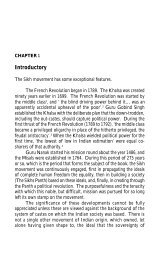Fundamental Issues Sikh Studies - Global Sikh Studies
Fundamental Issues Sikh Studies - Global Sikh Studies
Fundamental Issues Sikh Studies - Global Sikh Studies
You also want an ePaper? Increase the reach of your titles
YUMPU automatically turns print PDFs into web optimized ePapers that Google loves.
51<br />
The history and heritage of this religion, whether in its<br />
principles, doctrines, and sacred pronouncements, or in the practical<br />
lives of its founders and followers, “has been one of exhortation to<br />
liberation from all kinds of degrading bondage, mental, spiritual and<br />
social. Long before the modern idea of social freedom was evolved in<br />
the West, <strong>Sikh</strong>ism had brought to mankind the message of freedom. In<br />
its social aspects, it was a movement of freedom from feudalism and<br />
caste tyranny. While spiritually it brought to man liberation from<br />
feudalism and caste tyranny, spiritually it brought to man freedom<br />
from suppression and those false beliefs which enslaved man to a<br />
selfish or ignorant priest-craft whether the priest was called Brahmin,<br />
Yogi or Mullah.” The founder of the holiest <strong>Sikh</strong> shrine and the compiler<br />
of the <strong>Sikh</strong> Scripture, Guru Arjan Dev, has himself recorded the impact<br />
of this unique movement in the following verse:<br />
“The egg-shell of doubt has shattered<br />
and the mind is illumined ;<br />
The Master has freed us from bondage<br />
by cutting off fellers from our feed.” 166<br />
This is the verse which Macauliffe while recognizing its lasting<br />
significance, reproduced on the title-page of each of the six volumes<br />
of his magnum opus, The <strong>Sikh</strong> Religion, published in 1909 by the<br />
Oxford University. This is also the verse on the basis of which Banerjee<br />
stated, seventy years later: “The fetters of ritualistic religion were cutoff<br />
and the captives were… freed; and the foundations of the Spiritual<br />
Empire were laid. On these foundations was raised an imposing<br />
structure of Temporal Empire, blessed by Guru Gobind Singh’s neverto-be<br />
forgotton utterance: ‘RAJ KAREGA KHALSA’.<br />
REFERENCES<br />
1 Its operative clause, in the original, reads as follows: “Nanak prastan ra har ja kih bayab<br />
and baqatal rasanand.” Akhbar-i-Darbar-i-Mualla (cf. A Brief Account of the <strong>Sikh</strong> People,<br />
by Prof. Dr. Ganda Singh, Amritsar-1956; reprint, Delhi-1971, p. 29)<br />
2 Gupta, Prof. Dr. Hari Ram, History of the <strong>Sikh</strong>s Vol. II, 3rd. revised edition, New Delhi-<br />
1978, p. 39. See also Browne, James History of the Origin and Progress of the <strong>Sikh</strong>s<br />
(India Tracts), London-1788, Vol. II p. 13; M’Gregor, W.L., The History of the <strong>Sikh</strong>s,<br />
London-1846, Vol. I, pp. 113-114<br />
3 Latif, Syed Mohammad, A History of the Panjab from the Remote Antiquity to the<br />
Present Times, Ca1cutta-1891, p. 213<br />
4 Miskin, Tahmas Khan, Tazkirah-Tahmas Miskin, also called Tahmas Namah, MS. No.

















